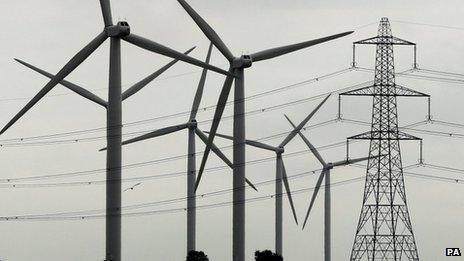Scottish independence: Politicians row over energy market post-yes
- Published

A row has broken out over the future of energy in the event of independence
A row over the future of the UK energy market has erupted between politicians on the two sides of the Scottish independence debate.
Shadow Energy Secretary Caroline Flint believed consumers would face higher energy bills post-independence.
However, Scotland's Energy Minister Fergus Ewing said the Labour MP's intervention was about political point scoring.
Voters in Scotland will decide on their country's future in September.
They will be asked the straight "yes/no" question: "Should Scotland be an independent country?"
Ms Flint questioned why English and Welsh households would want to continue "subsidising" renewable energy investment north of the border.
She claimed that Scottish consumers contributed less than a tenth of the cost of supporting clean energy and they benefited from the UK's ability to spread costs.
But the Scottish government's White Paper on independence, external said current levels of subsidy from across the UK should be maintained, with the retention of a single Great Britain-wide energy market keeping prices stable and energy supplies secure.
Ms Flint told BBC Radio's Good Morning Scotland programme: "Around a third of the investment in renewables goes to Scotland, but Scottish bill payers contribute less than one tenth of the cost to the overall pot.
"So, because of our union, because of our partnership there is a sharing of both the risks and the rewards when it comes to energy. But if Scotland decides to exit the UK that changes the relationship."
Caroline Flint: "Because of our [UK] partnership there is a sharing of both the risks and the rewards when it comes to energy."
She said if independence were to happen the relationship between Scotland and the rest of the UK would become a commercial one in terms of energy.
Ms Flint believed there would be an opportunity to look elsewhere for energy markets, including France, the Netherlands and Ireland.
She added that in England and Wales there were renewable and nuclear options, but if Scotland "were to have less windy days then it would look to the rest of the UK to keep the lights on".
But Scotland's Energy Minister Fergus Ewing said Ms Flint's intervention appeared to be political point scoring.
Fergus Ewing: "It is a shame that Caroline Flint is more concerned about making political threats than addressing the reality of the electricity market in the UK."
On the issue of energy availability, the SNP MSP told Good Morning Scotland: "The regulator Ofgem has issued a series of warnings to the UK government that the capacity margin over peak demand and available generation supply has dwindled to an alarming 2% with a real risk of brownouts and blackouts south of the border. In Scotland the margin is much more comfortable.
"For the foreseeable future - and this is accepted in industry and generation circles - there is a real risk of when we turn the switches on, the lights south of the border will not come on because there will not be electricity there."
He added: "The reality is the market in the UK relies, and will continue to rely, on the importation from Scotland of substantial quantities of our electricity.
"It is a shame that Caroline Flint is more concerned about making political threats than addressing the reality of the electricity market in the UK."